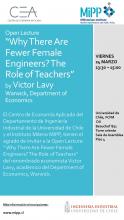
The Center for Applied Economics of the Department of Industrial Engineering, University of Chile and the Milenio Institute MIPP are pleased to invite for the Open Lecture: “Why There Are Fewer Female Engineers? The Role of Teachers” by renowned economist Victor Lavy, Department of Economics, Warwick.
Subscriptions here
Abstract
Recent research focus on what shapes gender differences in academic achievements and in university field of study. In this paper we focus on how teachers’ gender role attitudes and stereotypes influence the gender gap by affecting the environment at school. We explore the extent to which teachers’ gender bias in high school influences students’ academic performance in high-stake exams that determine admission to universities and on students’ choice of university field of study. We use data from large number of high schools in Greece where the performance in these high stake exams are the sole determinant of university admission. We measure teachers’ bias as the difference between a student’s internal exam score in 11th and in 12th grade (scored by the students’ teachers) and her external exam score (taken at the end of 11th and 12th grade and scored nationally). We then define a teachers’ bias measure at the class level by the difference between boy’s and girl’s average gap between the school score and the national score. Positive values indicate that a teacher is biased in favor of boys in a particular subject. We link teachers over time and are therefore able to get a persistent teacher bias measure based on multiple classes, and the effect is estimated for later students’ performance. The panel data on teachers relieves concerns that our measure of gender bias may just pick up random (small sample) variation in the unobserved “quality” or “non-cognitive” skills of the boys vs. girls in a particular single class or any other class specific dynamics. We find that the same teachers who are biased for one class are biased in the same way for other classes in the same year and in classes in earlier or later academic years. We find that the teachers’ biases in core and elective subjects (classics, social science, science, exact science) have positive effect on boys’ and negative effects on girls’ 12th grade external national exams scores. All the estimates are precise and statistically significant. We find that the effect of female and male teachers’ biases are not statistically different except for the effect in the exact science track. In the second part of the paper we estimate the effect of high school teachers’ biases on university enrollment and on the choice of university’s field of study. Based on multiple-choice regressions, teachers’ biases have a negative and statistically significant effect on girls’ choice of program of study. The respective estimated effects on boys are positive but small and imprecise. These biases also have an effect on the quality of the university that student enrolled at and the program of study admitted to.
Location:
Beauchef 851, Floor 4 - Departamento de Ingeniería Industrial, U. de Chile
Organizers:
Victor Lavy
MIPP Chile 2024